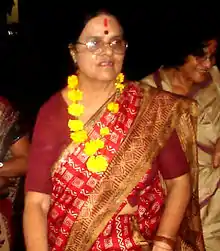National Commission for Women
The National Commission for Women (NCW) is the statutory body of the Government of India, generally concerned with advising the government on all policy matters affecting women. It was established in 31 January 1992 under the provisions of the Indian Constitution,[1] as defined in the 1990 National Commission for Women Act.[2] The first head of the commission was Jayanti Patnaik. As of 30 November 2018, Rekha Sharma is the chairperson.[3]
 | |
| Commission overview | |
|---|---|
| Formed | 1992 |
| Jurisdiction | Government of India |
| Headquarters | New Delhi |
| Commission executive |
|
| Website | http://www.ncw.nic.in |
Activities
The objective of the NCW is to represent the rights of women in India and to provide a voice for their issues and concerns. The subjects of their campaigns have included dowry, politics, religion, equal representation for women in jobs, and the exploitation of women for labour. They have also discussed police abuses against women.[4]
The commission regularly publishes a monthly newsletter, Rashtra Mahila, in both Hindi and English.[5]
Controversies
Section 497 of the Indian Penal Code
In December 2006 and January 2007, the NCW found itself at the center of a minor controversy over its insistence that Section 497[6] of the Indian Penal Code not be changed to make adulterous wives equally prosecutable by their husbands.
But the grounds on which Ms. Vyas resists the logic of making this a criminal offence — particularly for women, as often recommended — are not as encouraging. She is averse to holding the adulterous woman equally culpable as the adulterous man because women, she believes, are never offenders. They are always the victims.[7]
The NCW has demanded that women should not be punished for adultery, as a woman is "the victim and not an offender" in such cases. They have also advocated the amendment of Section 198 of the CrPC to allow women to file complaints against unfaithful husbands and prosecute them for their promiscuous behaviour. This was in response to "loopholes" in the Indian Penal Code that allowed men to file adultery charges against other men who have engaged in illicit relations but did not allow women to file charges against their husbands.[8]
The Commission has also worked to guarantee women security in unconventional relationships.[7]
Mangalore pub attack controversy
The NCW came under sharp criticism for their response to the attack by forty male members of the Hindu right-wing Sri Ram Sena on eight women in a bar in Mangalore in late January 2009. Video from the attack shows the women were punched, pulled by their hair, and thrown out of the pub.[9][10]
NCW member Nirmala Venkatesh was sent to assess the situation, and said in an interview that the pub did not have adequate security and that the women should have protected themselves. Venkatesh said, "If the girls feel they were not doing anything wrong why are they afraid to come forward and give a statement?"[11] On 6 February, the NCW said they decided not to accept Venkatesh's report but would not be sending a new team to Mangalore. On 27 February, the Prime Minister's Office approved the removal of Nirmala Venkatesh on disciplinary grounds.[12]
Guwahati molestation controversy
The NCW came under fire again after the molestation of a 17-year-old girl by a gang of men outside a pub in Guwahati on 9 July 2012. NCW member Alka Lamba was accused of leaking the name of the minor victim to the media, and was subsequently removed from the fact-finding committee, though she remains a member of the commission.[13] The following week, NCW chairperson Mamta Sharma made comments suggesting that women "be careful how you dress", which invited criticism that she was guilty of victim blaming. The controversy led activists to call for a restructuring of the commission.[14][15]
Badaun rape and murder controversy
In 2021, the NCW was once again criticised for engaging in victim blaming following the gang rape and murder of a woman inside a temple in Badaun, Uttar Pradesh. A two member delegation from the NCW was sent to the site of the incident to meet with the victim's family and prepare a fact-finding report. NCW member Chandramukhi Devi, who was part of the delegation, stated to the press that part of the blame for the incident lay with the victim, as she had chosen to visit the temple late in the evening. Devi stated, "A woman should not go out at odd hours under the influence of somebody. I think if she had not gone out in the evening, or had some child along with her, this could have been prevented."[16][17] The comments attracted wide criticism on social media, as well as from celebrities.[18][19] Following public criticism, Devi withdrew her remarks.[20]
Chairpersons
| No. | Name | Portrait | From | To |
|---|---|---|---|---|
| 1 | Jayanti Patnaik |  |
3 February 1992 | 30 January 1995 |
| 2 | V. Mohini Giri |
21 July 1995 |
20 July 1998 | |
| 3 | Vibha Parthasarathy |
18 January 1999 |
17 January 2002 | |
| 4 | Poornima Advani | .jpg.webp) |
25 January 2002 | 24 January 2005 |
| 5 | Girija Vyas |  |
16 February 2005 | 15 February 2008 |
| 6 | Girija Vyas |
9 April 2008 |
8 April 2011 | |
| 7 | Mamta Sharma[21] |
2 August 2011 |
1 August 2014 | |
| 8 | Lalitha Kumaramangalam | %252C_Smt._Lalitha_Kumaramangalam_delivering_the_valedictory_address_at_the_5th_National_Conference_of_Heads_of_Prisons_of_States_and_UTs_on_Prison_Reforms%252C_in_New_Delhi.jpg.webp) |
29 September 2014 | 28 September 2017 |
| 9 | Rekha Sharma | 7 August 2018 | Present | |
See also
- Domestic violence in India
- Dowry system in India
- Female foeticide in India
- Feminism in India
- Gender inequality in India
- Gender pay gap in India
- Men's rights movement in India
- Rape in India
- Welfare schemes for women in India
- Women in India
- Women in Indian Armed Forces
- Women's Reservation Bill
- Women's suffrage in India
References
- "NCW :: About NCW". ncw.nic.in. National Commission for Women. Archived from the original on 16 October 2014. Retrieved 28 September 2014.
- Act No. 20 of 1990 of Govt. of India
- "Archived copy". Archived from the original on 15 January 2018. Retrieved 4 January 2018.CS1 maint: archived copy as title (link)
- http://www.indiatogether.org/2006/may/wom-ncw.htm
- "Archived copy". Archived from the original on 18 January 2007. Retrieved 5 February 2007.CS1 maint: archived copy as title (link)
- "NCW rejects proposal to punish women for adultery". The Hindu. 26 December 2006. Retrieved 15 August 2015.
- "One World.net". Archived from the original on 27 September 2007. Retrieved 7 January 2007.
- Prakash, Satya, "What constitutes adultery?" Hindustan Times, 25 December 2006,
- "Mangalore: Attack on Pub now a National Concern!". Archived from the original on 30 January 2009. Retrieved 6 February 2009.
- "India shocked as 'moral police' beat girls out of pub". Russia Today. Retrieved 6 February 2009.
- Roche, Florine (30 January 2009). "Mangalore Pub Attack - National Commission for Women Recommends Punishment Under Article 307". Retrieved 6 February 2009.
- "NCW rejects report, blames security lapse for pub attacks". 6 February 2009. Archived from the original on 7 February 2009. Retrieved 6 February 2009.
- "Guwahati molestation case: Chief Minister's office accidentally names victim, then retracts". www.ndtv.com. Retrieved 28 September 2014.
- "Guwahati molestation: NCW chief Mamta Sharma advises women to dress 'carefully'". 18 June 2012. Retrieved 18 June 2012.
- "Guwahati molestation: Activists demand NCW restructure". Retrieved 18 June 2012.
- "NCW Member's Shocker: Badaun Gangrape-Murder Victim Shouldn't Have Gone Out in Evening". News18. 7 January 2021. Retrieved 8 January 2021.
- "Incident could have been avoided had woman not gone out in evening: NCW member on UP gangrape". Deccan Herald. 7 January 2021. Retrieved 8 January 2021.
- "Taapsee Pannu, Urmila Matondkar, Pooja Bhatt slam NCW member's victim-blaming comments about Budaun gang-rape". Hindustan Times. 7 January 2021. Retrieved 8 January 2021.
- Bureau, ABP News (7 January 2021). "Budaun Gangrape: NCW Member Blames Victim For Going Out In Evening, Irks Controversy". news.abplive.com. Retrieved 8 January 2021.
- Scroll Staff. "NCW member shames Budaun gangrape victim for going out alone in evening, withdraws statement later". Scroll.in. Retrieved 8 January 2021.
- "Mamta Sharma is NCW chief". The Hindu. New Delhi. 3 August 2011. ISSN 0971-751X. Retrieved 19 September 2014.